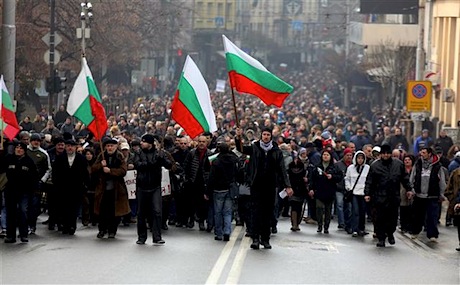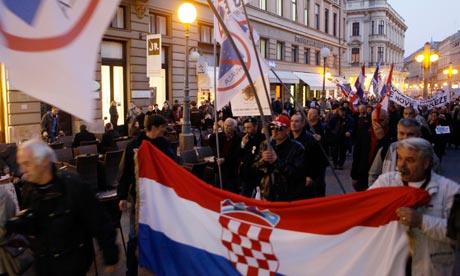
Police clash with Maidan protesters, January 19, 2014.

Mass protest in Tuzla, February

Parties elected -- Red: Communist; Orange: ČSSD; Blue: ANO 2011; Purple: TOP 09.
Jock Palfreeman interviewed by Tony Iltis, Sofia
May 17, 2013 -- Green Left Weekly -- “I’m in Villawood!”, Jock Palfreeman exclaimed, with the cheerful exuberance he displayed throughout an interview conducted through glass and wire-mesh partitions in the gloomy surroundings of the visiting room of Sofia central prison.
He told Green Left Weekly that it was the plight of refugees illegally detained in Sydney's Villawood detention centre by the Australian government that first radicalised him. His first protest, as a high school student in Sydney, was a blockade of the offices of Villawood’s then operator Australasian Correctional Management on May Day in 2002.
A year later he organised students at his school to attend the “Books Not Bombs” student walkouts to protest against the war on Iraq.
It was because of his seeming inability to ignore injustice that he is now serving a 20-year sentence in Bulgaria.
By Gyula Thurmer
March 27, 2013 -- Morning Star -- Hungary is in crisis. Almost 500,000 people are officially registered as unemployed -- just over 11 per cent of the workforce. About the same number of young people are working in other EU countries, notably Britain, Austria and Germany, because they could not find a job at home. Even so, the rate of youth unemployment (under the age of 25) in Hungary stands at more than 28 per cent.
The Fidesz (Civic Union) government led by Prime Minister Viktor Orban is well aware of these facts, while proclaiming the "Hungarian miracle". The reality is that many ordinary people are worse off than they have ever been.
The real winners under this capitalist government are those who earn more than 900,000 forints (£2500) net a month. The rest are on or below the average net salary of 157,000 forints (£434), which is absolutely nothing considering that prices in Budapest are similar to those in Vienna.
The pro-capitalist forces in Hungary know very well that only the Hungarian Communist Workers Party (HCWP) proposes a real alternative to mass unemployment, poverty and the colonial occupation of Hungary by multinational companies.

Mass protest in Sofia, Bulgaria's capital, February 17, 2013.

Protesters rally during anti-government protest in Zagreb, Croatia, March 2011. Photograph: Darko Bandic/AP.
[Links International Journal of Socialist Renewal urges its readers to consider taking out a subscription to Monthly Review, where this article first appeared.]
By Srećko Horvat and Igor Štiks

Protesters shout as a background banner reads "Freedom, Early Elections" during an anti-government rally in Bucharest, January 24, 2012.
By Rupen Savoulian
February 15, 2012 -- Antipodean Athiest, submitted to Links International Journal of Socialist Renewal by the author -- Back in 1989, Romania was gripped by mass protests, led by miners, against the corrupt and authoritarian regime of Nicolae Ceausescu. The protests in Romania were part of the generalised "Velvet Revolution" against the dictatorial, bureaucratised, deformed workers’ states in Eastern Europe.